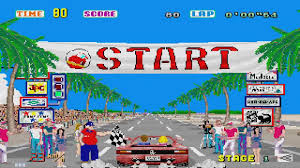I read an article the other day about the “forgotten” era of arcade conversions. When a game like Outrun or R-Type would be converted to run on the likes of a ZX Spectrum, Atari 2600 or Sega Master System. Halcyon days.

Back then, arcade hardware just couldn’t be replicated in the home at any kind of sensible cost, so there they stayed, to be pumped full of 10ps/quarters/¥100 coins by eager, starry-eyed obsessives like me and countless others.
Coin-op video games had a good time of it up until the early nineties, at which point, the likes of the Sega Mega Drive (Genesis in North America) arrived and blew people away.
I remember the sheer and utter excitement of being able to play what appeared to me to be a perfectly replicated version of Golden Axe in my friend’s bedroom. The arcade had properly made it into the home. There may have been other titles that did this before Sega’s classic hack ‘n’ slash title, but it was this moment for me that stands out as the gaming epiphany, the new dawn of video games.
Sadly, though, it only served to accelerate a decline that the video arcades had already been suffering from for some time.
We all know what happened next but, of course, what happens from now on is anybody’s guess. Having started in this industry in the early nineties, life took me down a different path after a few years, only to find myself right back in it in 2017. And goodness me - it’s barely recognisable. It’s taken me a while to get back into the swing of things. There are still a few of the old names and faces on the show circuit, but most have moved on along with many manufacturers and so too, it would appear, a lot of innovation.
I get that virtually all genres have been done to death and understand that most players get their gaming fix at home. Heck, I’m one of them! But is this any excuse to roll out tired, copy and paste titles, slap on some shiny graphics, even get a good licence and expect it to sell well?
The other problem that the industry faces is that a lot of PC and console gaming is now populated by sandbox games, RPGs, MMORPG and strategy titles, so chock-full of game play, missions and storylines that they require significant time investment on the part of the player and can be so massively rewarding on many levels. This, of course, wouldn’t work in an arcade title that needs a steady throughput of players to achieve a break-even and then profit.
So where do we go from here?
Well, like the home gaming industry, there’s a clutch of indie developers that are trying hard to reignite the public’s love for out-of-home gaming. ExA-Arcadia is a Japan-based team that is bringing its arcade system, similar to the 1990 Neo-Geo MVS, to the world and has just announced the first title that will made available. Strania EX is a mech-shooter game by developer G.Rev that promises ’90s style shoot-’em-up action with visuals and gameplay more befitting 2018. It will offer something new. There are other indie champions out there too, Shreeveport Arcade and Arcadeaholics, for instance. We Throw Switches make custom cabinets. There’re people out there that share the same drive and passion for the out-of-home game experience, so there’s hope.
A recent InterGame feature on esports gave a glance at the current trend for battle royale-style games like Fortnite and PUBG. Surely something along these lines would work well in an arcade? It wouldn’t require a huge price tag and could happily sit in an upright cabinet. Coin-op (I still can’t call it anything else, despite the growing lack of said coins these days) needs to move with the times, stay relevant, stay credible.
The arcade and the FEC have now come full circle with the recent arrival of the triple-A Xbox IP, Halo. The balance of power rests so firmly with consumer gaming that the conversions are now happening in reverse. However, as impressive as the cabinet looks, and as I’m sure the game experience will be, some locations simply won’t be able to house such a large game.
So, as we approach the 40th birthday of Taito’s genre-defining Space Invaders, the industry is in state of flux. Esports, VR/AR, redemption and bigger-than-a-40ft-container, reverse conversions all grab the headlines, but the indie saviours and coin-op enthusiasts are running just as hard alongside, keeping innovation alive.
While there are contemporary coin-op crusaders still out there, I think there are plenty of reasons to be optimistic.

